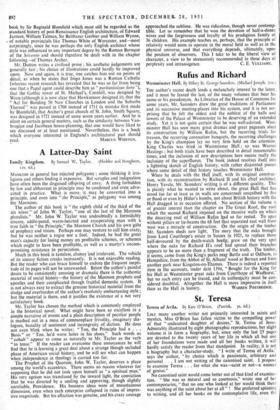St. Teresa
Teresa of Avila. By Kate O'Brien. (Parrish. 7s. 6d.) ' LIKE many another writer not primarily interested in saints and mystics, Miss O'Brien has fallen victim to the compelling power of that "undaunted daughter of desires," St. Teresa of Jesus. Admirably illustrated by eight photographic reproductions, her slight volume is in form a biography, but, since only the last 25 pages are devoted to the twenty years of her life in which all but one of her foundations were made and all her hooks written, it will hardly satisfy the reader from that standpoint. In reality, it is not a biography but a character-study. "I write of Teresa of Avila," says the author, "by choice which is passionate, arbitrary and personal . . I am not writing of the canonised saint. I propose to examine Teresa . . . for what she was—saint or not—a woman of genius."
No canonised saint would come better out of that kind of examina- tion. "She was so natural and so courteous," wrote one of her contemporaries, "that no one who looked at her would think there was anything of the saint about her at all" ! She preferred spinning to writing, and all her books on the contemplative life, even thz most sublime, The Interior Castle, were written, not from choice, but out of obedience to her superiors. She liked to engage in the humblest duties, and, wrote one of her nuns, "when it is her week to do the cooking, the community never lacks for anything." She travelled over the rough roads of sixteenth-century Spain with such ease that "she miiht have been going about on Mules all her life." And she stood up to princes and prelates, when a firm stand was necessary, as boldly and effectively as though she had been the only other Spanish woman who can compare with her in greatness— Queen Isabel the Catholic.
Many of the facets of this remarkable personality Miss O'Brien has certainly caught, and she illustrates her character-study with aptly chosen quotations. Here and there she may be thought by some readers to slip—notably in the reference to St. Teresa's "measured, not to say casual, appreciation of John of the Cross." Miss O'Brien can surely not have read the many letters in which she heaps eulogies upon the first friar of her reform, the other great saint of Carmel. " Great in the sight of God," "We have never seen the least imperfection in him," "A divine, heavenly man," "People look on him as a saint, which, in my opinion, he is and has been all his life." And, if these testimonies are not convincing enough, there is a striking one more personal than the rest: "You would never believe how lonely I feel without him . . . He is indeed the father of my soul and one of those with whom it does me most good to have converse." Not even with Gracian, generally con- _ sidered to have been her chief friend in the Order, had St. Teresa a closer spiritual affinity than with St. John of the Cross.
E. ALLISON PEERS.































 Previous page
Previous page